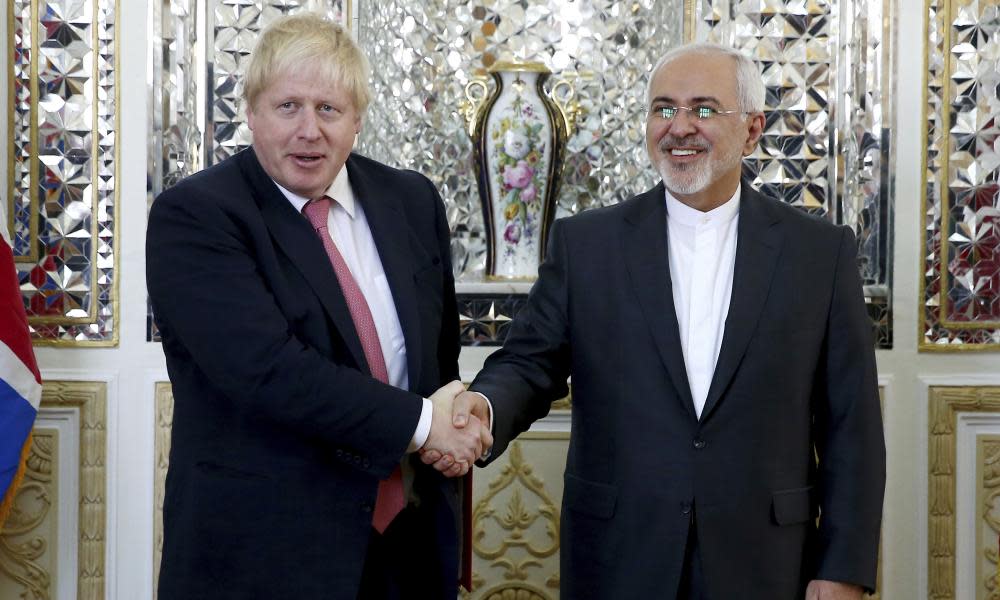Boris Johnson fails to access inner layers of Iran's 'Russian doll' | Patrick Wintour

Not long before travelling to Tehran for two days of talks, Boris Johnson described Iran as resembling “one of those Russian dolls”, in the sense that there is a state within the outer democratic Iranian state, primarily run by the Revolutionary Guards.
At one level, the bulk of his high-stakes talks were with the outer state of the president, Hassan Rouhani, and the foreign minister, Mohammad Javad Zarif. But in his efforts to secure the release of the UK dual national Nazanin Zaghari-Ratcliffe, it could be argued that he did not gain access to the inner state and revolutionary courts, the true decision-makers in her case.
The precise relationship between the two regimes remains opaque and, by seeing key figures such as the Iranian parliament speaker, Ali Larijani, the head of national security, Ali Shamkhani, and Rouhani, Johnson got close to the relevant levers of power.
Former British diplomats to Iran said Johnson needed to show respect and seriousness with his interlocutors, and after making the first visit in two years, the Iranians said they were left with the impression that Johnson acknowledged that Iran has a legitimate right to a view on the fate of the region.
It may be a disappointment to some that the foreign secretary was unable to leave Tehran with Zaghari-Ratcliffe, but her immediate release from prison was always regarded as highly implausible.
Nevertheless, there are signs that he made progress. Plans to impose further charges on her on Sunday, trailed in the Iranian media, appear to have been shelved, which was welcomed as a glimmer of hope by her husband, Richard Ratcliffe. The deferment will be a special relief to Johnson, since it is said that his inaccurate claim that Zaghari-Ratclifffe may have been in Iran to teach journalists had provided a pretext to lay further charges against her.
Western diplomats described the decision not to go ahead with the case on Sunday as “not a negative”.
It was encouraging that Rouhani granted Johnson an audience on the second day of his trip, something that could have been withheld if the first day of talks had been regarded as a failure. In his discussions with Rouhani, Johnson was able to play one powerful card – his strong personal defence of the 2015 Iran nuclear deal under pressure from Donald Trump. The Iranians urged Johnson to convey to the US president that the deal was in serious jeopardy. Similarly, the UK’s rejection of Trump’s recognition of Jerusalem as the capital of Israel will have reassured Iran that Britain is willing to be independent of the US.
Although the Foreign Office denies any link to hostage releases, Johnson spent some time in Oman before going to Iran, and the former is seen as a key player in solving the Yemen dispute, in which Iran and the UK are effectively on opposing sides.
All these signs potentially set relations on a more stable footing, but both countries still have specific issues that set them apart.
After his blunder, Johnson cannot let the Zaghari-Ratcliffe case rest. British politicians with knowledge of Iran, such as Norman Lamont, have argued that Tehran’s campaign against dual nationals may be a deliberate strategy by hardliners who oppose the nuclear deal and fear dual nationals could do a lot of business in Iran. That makes individual cases harder to settle.
Iran would like to see the UK pay the up to £300m Britain acknowledges it owes Iran for the failure to sell Chieftain tanks. The UK says it has not found a way of paying the sum that does not fall foul of sanctions.
Tehran would also like to see the three main Iranian banks in the UK, and the Iranian embassy, free to enter the UK banking system, so UK commercial banks clear their cheques in sterling. But proposals for the Bank of England to underwrite these transactions are regarded as impractical.
Finally, the Iranians are angry that trade with the UK has not risen as much as with other European countries since sanctions were lifted.
The reason for this is US “primary sanctions” remain in place. American individuals and companies remain broadly prohibited from engaging in transactions or dealings with Iran’s government and financial institutions, unless such activities are authorised by the Office of Foreign Assets Control.
Large British banks, unlike regional German ones, have significant exposure to the US, and fear sizeable fines if they trade in Iran with a company linked to banned entities.
It is no comfort for Zaghari-Ratcliffe that her incarceration continues, but she can only hope that a weekend of quiet rebuilding of relations eventually helps bring her release.

 Yahoo News
Yahoo News 
